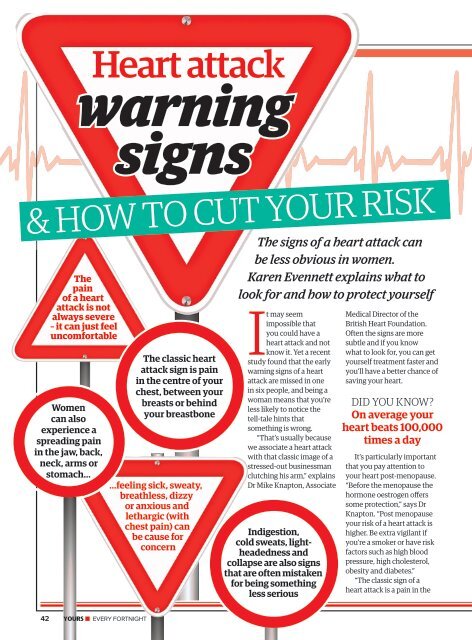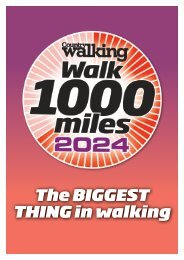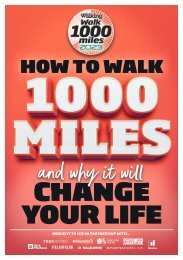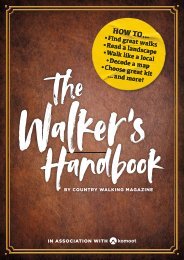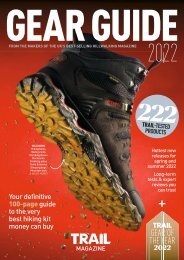You also want an ePaper? Increase the reach of your titles
YUMPU automatically turns print PDFs into web optimized ePapers that Google loves.
Heart attack<br />
warning<br />
signs<br />
& how to cut your risk<br />
The<br />
pain<br />
of a heart<br />
attack is not<br />
always severe<br />
– it can just feel<br />
uncomfortable<br />
Women<br />
can also<br />
experience a<br />
spreading pain<br />
in the jaw, back,<br />
neck, arms or<br />
stomach...<br />
The classic heart<br />
attack sign is pain<br />
in the centre of your<br />
chest, between your<br />
breasts or behind<br />
your breastbone<br />
...feeling sick, sweaty,<br />
breathless, dizzy<br />
or anxious and<br />
lethargic (with<br />
chest pain) can<br />
be cause for<br />
concern<br />
The signs of a heart attack can<br />
be less obvious in women.<br />
Karen Evennett explains what to<br />
look for and how to protect yourself<br />
It may seem<br />
impossible that<br />
you could have a<br />
heart attack and not<br />
know it. Yet a recent<br />
study found that the early<br />
warning signs of a heart<br />
attack are missed in one<br />
in six people, and being a<br />
woman means that you’re<br />
less likely to notice the<br />
tell-tale hints that<br />
something is wrong.<br />
“That’s usually because<br />
we associate a heart attack<br />
with that classic image of a<br />
stressed-out businessman<br />
clutching his arm,” explains<br />
Dr Mike Knapton, Associate<br />
Indigestion,<br />
cold sweats, lightheadedness<br />
and<br />
collapse are also signs<br />
that are often mistaken<br />
for being something<br />
less serious<br />
Medical Director of the<br />
British Heart Foundation.<br />
Often the signs are more<br />
subtle and if you know<br />
what to look for, you can get<br />
yourself treatment faster and<br />
you’ll have a better chance of<br />
saving your heart.<br />
Did you know?<br />
On average your<br />
heart beats 100,000<br />
times a day<br />
It’s particularly important<br />
that you pay attention to<br />
your heart post-menopause.<br />
“Before the menopause the<br />
hormone oestrogen offers<br />
some protection,” says Dr<br />
Knapton. “Post menopause<br />
your risk of a heart attack is<br />
higher. Be extra vigilant if<br />
you’re a smoker or have risk<br />
factors such as high blood<br />
pressure, high cholesterol,<br />
obesity and diabetes.”<br />
“The classic sign of a<br />
heart attack is a pain in the<br />
If in doubt, check it ouT!<br />
If you’re getting unusual, grumbling indigestion-like<br />
symptoms often and you’re concerned they could be to<br />
do with your heart, your GP can refer you to a chest clinic<br />
within two weeks to explore the underlying reason.<br />
If you have a sudden and acute pain that you<br />
suspect is a heart attack, or any or the symptoms<br />
mentioned, call 999! “Taking an aspirin could help<br />
to reduce a clot, but don’t search for aspirin. It’s more<br />
important to make that emergency call and then rest<br />
quietly until help arrives,” says Dr Knapton.<br />
Did you know? Your<br />
heart is about the same<br />
size as two hands<br />
clasped together<br />
centre of your chest, between<br />
your breasts or behind your<br />
breastbone – but 37 per cent<br />
of women have no chest<br />
pain with their heart attacks,”<br />
says Professor Sliwa,<br />
President-Elect of the World<br />
Heart Federation.<br />
Spreading pain or<br />
discomfort in other areas of<br />
your upper body – such as<br />
your arms, back, jaw, neck or<br />
stomach – are also warning<br />
signs, and one in four women<br />
whose heart attacks have<br />
gone unrecognised have had<br />
these less obvious symptoms.<br />
Shortness of breath,<br />
unexplained weakness or<br />
fatigue, anxiety or unusual<br />
nervousness can also be<br />
surprising signs. “Indigestion,<br />
gas-like pain, cold sweats,<br />
nausea, light-headedness and<br />
collapse are also signs that<br />
are often mistaken for being<br />
something less serious,” says<br />
Professor Sliwa.<br />
Take note if you are feeling<br />
sick, sweaty, breathless or<br />
light-headed or generally<br />
feel unwell or lethargic with<br />
associated chest pain or<br />
discomfort.<br />
Women’s hearts<br />
are different<br />
“You have different risk<br />
factors to men,” says Professor<br />
Sliwa. “Women are more at<br />
risk of developing high blood<br />
pressure before the age of 45<br />
than men, putting strain on<br />
their hearts for longer, and<br />
you’re more likely to become<br />
obese. Women are also more<br />
likely to take up smoking<br />
than men. All these things are<br />
major risk factors for heart<br />
disease.”<br />
Did you know?<br />
A woman’s heartbeat is faster than a<br />
man’s by almost eight beats a minute<br />
stay healthy<br />
6ways to lower<br />
your risk<br />
1<br />
If you do one thing, GIVE UP SMOKING. As<br />
a woman, even two or three cigarettes a day<br />
double your risk of a heart attack (a man’s<br />
risk is doubled with five or six cigarettes a day).<br />
2Research suggests that HAPPINESS and<br />
a strong sense of wellbeing can<br />
have an impact on our heart health. Make a<br />
point of doing things that will lift your mood – a<br />
chat with a friend or watching a funny film could<br />
boost your heart health.<br />
3<br />
“You should also TAKE MORE<br />
EXERCISE. Try not to be put off if the<br />
guidelines seem unachievable. The<br />
recommended 150 minutes of exercise per<br />
week can feel daunting, but do<br />
whatever amount you can manage<br />
– it may well spur you on to do<br />
more. Don’t think, ‘it’s too<br />
late for me’ – the earlier you<br />
start improving your lifestyle<br />
the more you will gain,” says Dr<br />
Knapton. If you do less than one<br />
hour’s exercise a week you have nearly a 50 per cent<br />
higher chance of developing coronary heart disease<br />
than a woman who does three hours a week.<br />
4<br />
Even if you take lots of exercise, you’ve<br />
more than double the usual risk of a<br />
suffering a heart attack if you’re also obese<br />
(which means you have a BMI of 30 or more).<br />
It’s essential to WATCH YOUR WEIGHT and a<br />
traditional Mediterranean diet, rich in vegetables,<br />
oily fish and wholegrains, naturally includes most<br />
of the key diet changes that will help to keep your<br />
heart healthy.<br />
5Women should stick to the<br />
alcohol guidelines and drink no<br />
more than 2 or 3 units a day (for men the<br />
limit is 3 or 4 units). Over time, drinking too<br />
much alcohol can put you at risk of heart attack<br />
and stroke.<br />
6<br />
KNOW YOUR NUMBERS … Past the age<br />
of 40 you’re entitled to a NHS Health<br />
Check every five years at which your<br />
blood pressure and cholesterol will be tested.<br />
Speak to your GP or Practice nurse.<br />
42 YOURS n EVERY FORTNIGHT<br />
YOURS n EVERY FORTNIGHT 43<br />
PICs: shutterstock


